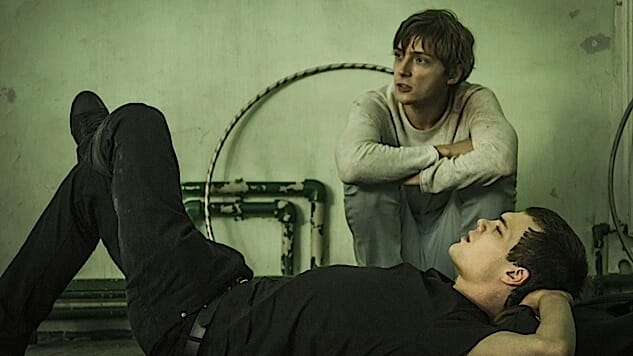
The jet-black satire The Student only slowly makes its intentions known, but the deliberateness is crucial to our understanding of what Russian director Kirill Serebrennikov is after. In its early going, we think this adaptation of a play by German writer Marius von Mayenburg is merely a chronicling of a troubled teen with a Bible fixation. Eventually, however, we realize that’s just part of the film’s larger societal critique. Though a bit uneven and at times strident, The Student has a righteous anger that feels like a tonic. It may be a commentary on the rise of regressive conservatism in Europe, but its themes echo across the globe, especially in the U.S.
The film stars Pyotr Skvortsov as Veniamin, a teen who somewhat recently has become a fervent Christian, reciting Bible passages from heart for seemingly every occasion. (Serebrennikov helpfully cites the passages’ book, chapter and verse on the screen, the visual footnotes increasing the sense of religious overkill.) Veniamin’s parents divorced not too long ago, and now he always dresses in black, so the fire-and-brimstone zeal may be merely as phase. But his passion and anger are unsettling all the same.
With his mother an ineffectual presence at home, Veniamin is most engaged by two people at school. One is an impressionable classmate, Grisha (Aleksandr Gorchilin), who was born with one leg shorter than the other—Veniamin feels confident that if his de facto disciple prays sincerely enough, God will fix his leg.
But the other is Elena (Viktoriya Isakova), his thirtysomething science teacher who finds her lesson plans increasingly challenged by this willful boy. When she tries to promote condom use, Veniamin loudly declares that sex can only happen within a marriage—and that the act is for reproduction only. (He gets so excitable that he strips naked in front of the class to protest.) But perhaps even more disconcerting, Elena is getting pushback from the head of the school (a wonderfully rigid Svetlana Bragarnik), who thinks Elena is being too provocative by, for instance, teaching evolution without also discussing creationism. Veniamin may loudly defy Elena but, really, his resistance is emblematic of a larger, subtler problem in her school.
Often shooting scenes in long, unbroken takes that require tight choreography between multiple actors, Serebrennikov brings a big-screen energy to a theatrical work. But at the same time, he wants to pace out our indignation, a crucial decision when facing a main character who’s meant to be tiresome. Skvortsov does nothing to soften Veniamin, nor does he provide hints about where this corrosive attitude originated. Veniamin’s confidence is as unwavering as his inscrutability, leaving us trapped with a young man who’s impossible to like, let alone understand.
Not that The Student is a takedown of religious faith—it’s more accurate to say the film warns against the ways that some people use religion as a weapon to advance harmful, antiquated agendas. Because Veniamin is always hammering away at those around him, quoting the Bible to justify every one of his sexist, bigoted viewpoints, Elena decides to beat him as his own game, researching the Good Book to find passages that contradict his. It may be a fairly obvious point, but Serebrennikov makes it ardently: The reliance on ancient scripture to validate modern-day beliefs represents an outdated way of seeing the world, encouraging a close-minded perspective immune to new schools of thought or evolving social norms.
But Serebrennikov pushes his critique further, dramatizing society’s collective resistance to progress—not to mention observing how those standing up to religious zealotry can become just as entrenched and self-righteous as their opponents. Isakova puts us on Elena’s side instantly, the actress revealing her character’s frustration as everyone turns on her: the principal, her teacher boyfriend (who thinks she’s becoming obsessed in proving the kid wrong) and even her students (who find Veniamin’s rebellious actions cool in an anti-authority kind of way). Deftly, The Student illustrates the trap that progressives and intellectuals face when they try to stand up for their beliefs: They can come across as know-it-alls and scolds, and their ideas run counter to what’s safe and familiar, trying to apply ice-cold logic to situations in which emotions often run high.
Veniamin’s unblinking dogma can be darkly funny, the young actor emphasizing the character’s religious rigidity. Likewise, Isakova taps into Elena’s exasperation, eventually becoming so determined to defeat her young adversary that she becomes almost comically competitive. But The Student will later shift into a more serious direction, pitting our two main characters in a battle that seems to extend far beyond a schoolroom debate about how the earth was created. Serebrennikov sees modern life as a time when the forces defending the bad, old days are clinging to the Bible to bully others. In such a climate, the Elenas of the world are fighting a lonely, possibly losing battle, even if they have the facts on their side. No wonder she’s the one going insane.
Director: Kirill Serebrennikov
Writers: Kirill Serebrennikov (screenplay); Marius von Mayenburg (play)
Starring: Pyotr Skvortsov, Viktoriya Isakova, Svetlana Bragarnik, Aleksandr Gorchilin
Release Date: Screening in Un Certain Regard at the 2016 Cannes Film Festival
Tim Grierson is chief film critic for Paste and the vice president of the Los Angeles Film Critics Association. You can follow him on Twitter.